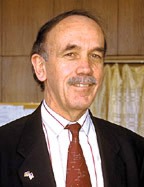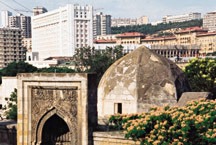|
Summer 1998 (6.2)
Last Thoughts
Before Leaving Baku
What was it like in the early
days when the first groups of managers were coming over from
the oil companies? There were huge problems at that time and things got worse before they got better. The war with Armenia was going on. Factory output was falling. Productivity was falling. More and more people were out of jobs. My company was asking itself questions like: "Is this a stable situation to invest in?" We were very attentive to how the war was progressing. I often looked at maps and tried to understand what the situation was and where the action was happening. The situation looked quite grim up until May 1994, when a cease-fire was signed.
We were very happy to see that a stable government did get established. We began to see an end to the relentless depression that had been imposed on the country. Conditions began to improve for us and for the Azeris. People from Moscow kept asking us, "Why are you in Azerbaijan?" They considered Azerbaijan to be some sort of "backyard" for them. And I replied that for UNOCAL Azerbaijan is the "frontyard." We held the exact opposite view. Because of Azerbaijan's geographical position, we envisaged that you could get the oil out of here with a minimum of problems compared to further distances inside Russia. Although these matters are very complex even now, we still believe it is a viable place to do business. Our perceptions are based on the continued demonstration of independence that this country has exhibited. As everyone knows, the opportunities for oil production are quite immense here compared to many other countries of the world. We'll see in next few years if our perception and judgment is correct. Sometimes people arrive in
Baku and complain about things-that must make you laugh, considering
how much things have changed. Are there any new challenges? I've seen the Azeri side learn how to handle foreigners, too. It took a while to build trust between the two groups. The people who negotiated the oil deals were very professional. Once we got past the first stage and it was shown that the "Contract of the Century" (the AIOC contract signed in 1994) was possible, other companies were encouraged to come forward and think seriously about investing in Azerbaijan. I'm glad that my company saw the opportunity much earlier, and had enough faith in Azerbaijan to believe that it could be a viable investment. It's difficult to do business in Azerbaijan unless you understand their point of view and get to know and trust them. Valuable relationships go beyond business. One thing I'm taking away from this experience is an appreciation for the individuals I've met and worked with here - I'll never forget them. Tell us about your experiences
at the American Embassy. I'll never forget one morning, I was trying to go inside the embassy, and I could tell that the security guard was new to the job. He'd been given a list of how to check visitors, so he immediately went down the list and started asking questions in his faltering English. And then he asked me: "Do you have a gun?" And I replied, "No, I don't, but I can go out and get one if that's what is required to get in here!" I guess that was a bit unfair of me to say, since his English wasn't so good and he was just trying to do his best. I saw him again a few months later. He took one look at me and laughed: "Did you bring your gun?" Do you have any advice for
expatriates who are coming to Azerbaijan for the first time? I guess my advice to people coming to Azerbaijan is to be sensitive about what's going on here. Be aware of the transitions that are occurring here. Understand where Azerbaijan has come from and realize the huge problems that have been tackled. Once you show some sensitivity to these things, you'll understand that you're very fortunate coming from the background that you do. You probably take its framework of law and order for granted. Let's talk some more about
your own experience in Azerbaijan. You were one of those who
was involved with humanitarian organizations early on. In fact, tomorrow we're scheduled to go out to Fuzuli area to look at newly constructed homes that will replace those which were damaged by the war. I think, apart from giving money to humanitarian organizations that oversee such projects, we need to show solidarity with their efforts. We need to go out there and appear-even if it's just a few times a year. Even so, to do that and show interest helps urge them on. One thing I thought early on when we were trying to set up the American Chamber of Commerce (AmCham) was that Americans needed ways of demonstrating its support of this country especially since the U.S. government has blocked all direct aid to this country. It's great to see AmCham up and running and I hope it continues to grow. We have people now who will carry it forward. Now that you're going back
to Sydney. Does that mean you've retired? So, what are you going to
do? What's your next assignment? Do you expect to come back
to Baku for a visit? My homeland, Australia, is a long way from here. Although they begin with the same letter, they're really a long way apart! Over the years, I've made many trips between these two countries. Someone from an airline company once asked me: "How could we help you with the trips between the two?" And I said: "Well, for starters, you could move the two countries a bit closer together." In the year 2000, Azerbaijan
and Australia will be close together when the Olympic games are
held in my hometown, Sydney. I'll be happy to see the Azerbaijan
team there, and I'll make sure to cheer them on. |


